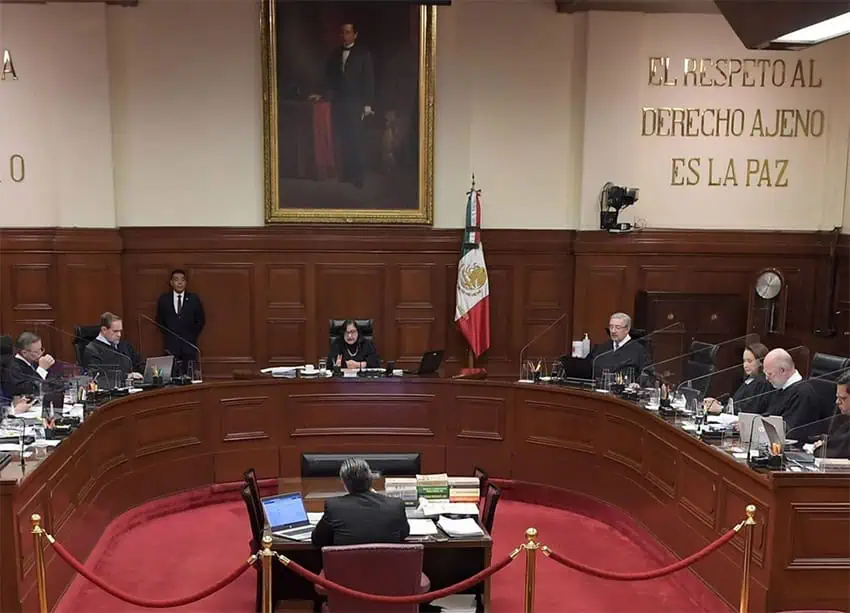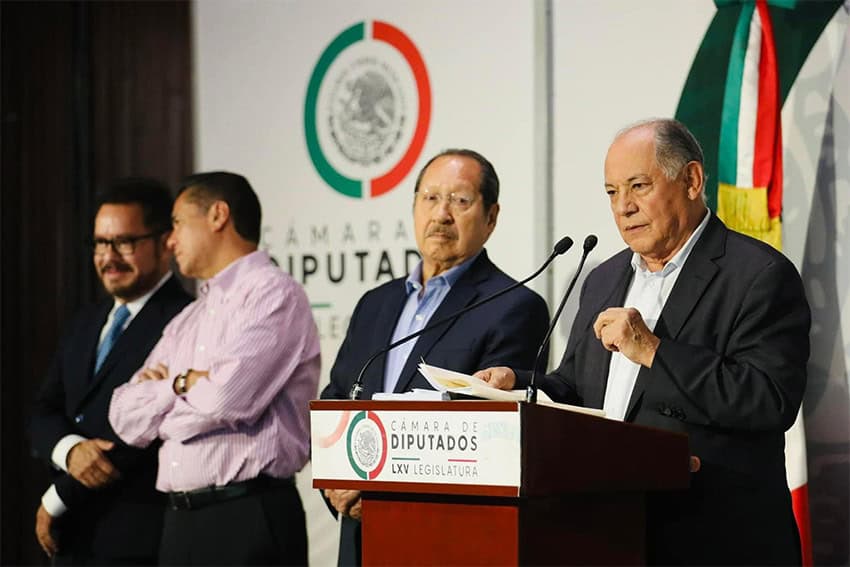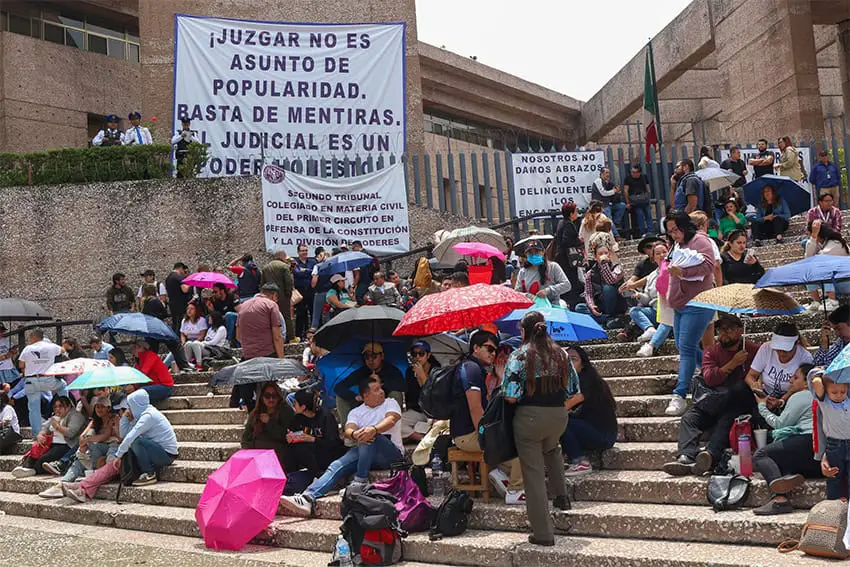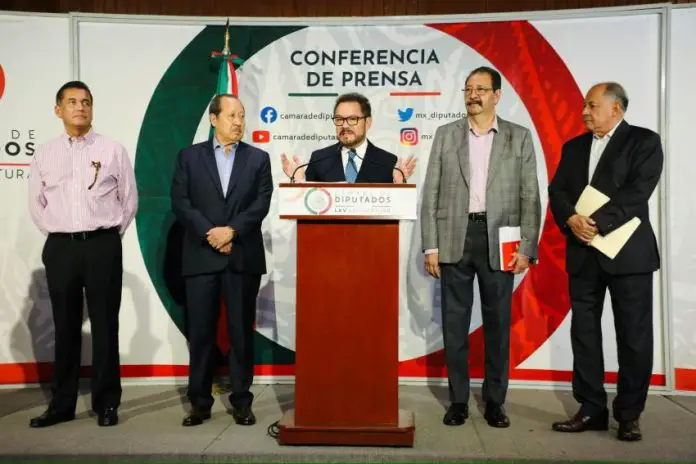Federal court employees in Mexico went on strike Monday over President Andrés Manuel López Obrador’s proposed judicial reform bill. The strike comes just after Morena, the president’s party, announced a series of modifications to the proposal on Friday.
If the judicial reform passes Congress, it will allow Mexicans to directly elect Supreme Court justices and other judges starting next year.
The ruling Morena party submitted to Congress on Friday a modified version of the constitutional reform proposal President Andrés Manuel López Obrador sent to the federal legislature in February.
Ignacio Mier, Morena’s leader in the Chamber of Deputies, told a press conference that the judicial reform proposal filed with the Constitutional Points Committee of the lower house has more than 100 changes from the original draft submitted by López Obrador.
The changes are the result of a public consultation process, held after President-elect Claudia Sheinbaum pledged that “broad consultation” would occur before the proposal is discussed by Congress.
Despite the changes, the key objective of the initiative remains — to allow citizens to elect judges. Candidates would be put forward by the sitting president, lawmakers and the judiciary itself. An equal number of men and women would have to be nominated.

Critics of the reform argue that it would jeopardize the independence of the judiciary and reduce checks and balances on executive power. López Obrador — an outspoken critic of the judiciary — denies the charges.
Mier said Friday that one modification allows for the staggered election of judges, but all 11 Supreme Court justices would be elected in 2025.
“It’s going to be gradual, it’s going to staggered. There will be an extraordinary election in 2025 [and] there will be another ordinary one at the same time as the federal [midterm] election in 2027. … The 2025 election will be to elect all justices of the Supreme Court and 50% of judges,” he said.
Mier said that various technical committees would ensure that candidates meet the legal criteria to be judges.
“This guarantees legal certainty and a justice system that guarantees the people of Mexico access to justice,” he said.
Mier said that the revised reform proposal would be made public in 10 days.
Juan Ramiro Robledo Ruiz, a Morena deputy and head of the Constitutional Points Committee, said that all current judges will be able to participate in elections.

“There won’t be campaigns” ahead of the elections but the candidates will have the opportunity to outline their merits at debates organized by the National Electoral Institute, he said.
As it seeks to change the constitution, the judicial reform proposal requires the support of at least two-thirds of lawmakers in both the Chamber of Deputies and the Senate in order to be approved.
Recently-elected lawmakers assume their positions on Sept. 1. Morena and its allies, the Labor Party and the Green Party, will have a two-thirds majority in the lower house.
However, they will be three votes short of a supermajority in the Senate. That means they will need to rely on the support of a few opposition senators to pass constitutional bills.
Still, the reform could conceivably be approved before López Obrador hands over the presidential sash to Claudia Sheinbaum on Oct. 1.
The president submitted 20 reform proposals to Congress in February, including ones aimed at disbanding a number of autonomous government agencies and incorporating the National Guard into the military.
Concern about the likely approval of the judicial reform in the wake of comprehensive victories by Sheinbaum and Morena in the June 2 presidential and congressional elections caused the Mexican peso to depreciate sharply against the US dollar.
Court workers go on strike over proposed judicial reform
Court employees across Mexico commenced strikes early Monday to protest the judicial reform proposal.

Among the states where indefinite strikes began are Mexico City, Nuevo León, Puebla and Yucatán. Various unions representing judicial employees organized the nationwide job action.
Court workers in Mexico City who spoke with the El Universal newspaper said they are “defending Mexico from the abuse of authoritarian power.”
They said they would attend to urgent judicial cases, including ones where people’s lives were potentially at risk.
Videos posted online showed some workers placing chains around gates to courts and other judicial complexes shortly after strikes began at midnight.
The judicial unions said in a statement that the judicial reform seeks to “subjugate the federal judicial power.”
The judiciary, they asserted, is “the only counterweight” to executive and legislative power and “the guarantor of the rights of all people of Mexico, against the abuses and arbitrary actions of authorities.”
Con este comunicado, trabajadores del Poder Judicial iniciaron el #ParoNacional e hicieron un llamado a la población para unirse a su causa pues alertan que la reforma pretende someter al Poder Judicial como contrapeso. #apartadomex pic.twitter.com/IrUfxVraPZ
— apartadomex (@ApartadoMex) August 19, 2024
The judicial workers’ union released a statement warning that the proposed reform would “subjugate” the judicial branch, compromising its ability to act as a check on the executive and legislative branches.
The unions also said that the proposed reform poses a threat to the rights of court workers as it “seeks to eliminate the judicial career” based on “a system of merit.”
In addition, they said that judicial workers — of whom there are some 55,000 in Mexico — haven’t been given the opportunity to express their views on the reform, asserting that they were denied access to forums where it was discussed.
AMLO: Workers who continue to strike support corruption
At his morning press conference on Monday, President López Obrador said that court workers have the right to protest. He also defended his government’s judicial reform proposal.
“It doesn’t affect the workers. On the contrary, it benefits them. Let’s see if tomorrow or the day after it can be explained again,” he said, indicating that an official would outline the proposal at one of his upcoming pressers.
“… All this so the workers aren’t manipulated, so that the federal judicial workers have information. We’re not against the workers of Mexico, we’re against corruption and privileges,” said López Obrador, who has accused judges of serving the interests of the elite and described the salaries earned by some as “exaggerated and offensive.”
If workers decide to continue to strike even after they have the information to be presented by the government “they will serve as lackeys of those who are part of the corruption in the judicial power,” he said.
The Supreme Court and other courts have handed down various rulings against government projects and policies in recent years, angering the president.
López Obrador has claimed that Mexico’s judiciary is “at the service of a greedy and corrupt minority” of Mexican society as well as the country’s “conservative” political parties.
He has asserted that the nation’s judicial system needs to be overhauled, and believes that allowing citizens to elect Supreme Court justices and other judges is a key part of that process.
With reports from Bloomberg, El Universal, El Economista and Reuters
